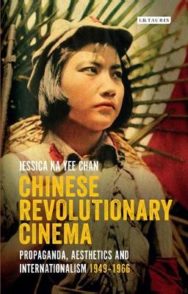
ABOUT THIS BOOK
PUBLISHER: I.B.Tauris & Co. Ltd.
FORMAT: Hardback
ISBN: 9781788311908
RRP: £69.00
PAGES: 240
PUBLICATION DATE:
August 30, 2018
BUY THIS BOOK
As an Amazon Associate and Bookshop.org affiliate we earn from qualifying purchases.
Chinese Revolutionary Cinema: Propaganda, Aesthetics and Internationalism 1949-1966
Jessica Ka Yee Chan
Engaging with key films from the decade and a half between 1949 and ’66, this book explores the aesthetic experiment of socialist cinema in China. In the years succeeding the Communist Revolution, the state produced a diversity of genres that functioned as propaganda for the newly established People’s Republic. Breaking from past forms, revolutionary cinema adapted and revised Chinese literature for the screen, incorporated aspects of Hollywood narration and appropriated Soviet montage theory for its own means, as well as orchestrating a new, glamorous, socialist star culture. Chinese film periodicals were quick to project and disseminate the country’s redefined self-image to both domestic and international domains as they helped to create an alternative vision of modernity and internationalism.The author of this study analyses these important aspects of cinematic culture, prior to the creatively oppressive onset of the Cultural Revolution, to enrich our understanding of the internationalist agenda and attraction of Chinese revolutionary cinema and its heroic storylines. Revealing the historical contingency and mutability of the term `propaganda,’ Chan uncovers the visual, aural, kinaesthetic, sexual and political appeal that lies at the heart of the efficacy of propaganda as a persuasive form of pedagogy and entertainment. Based on extensive archival research, this book’s focus on the distinctive rhetoric of post-war Communist China will be of value to East Asian cinema scholars, Chinese studies academics and those interested in the history of 21st century socialist culture.
Jessica Ka Yee Chan
Jessica Ka Yee Chan is Assistant Professor of Chinese Studies at the University of Richmond, USA. She teaches courses on Chinese cinema, the action genre in East Asian cinema and myths and parables in Chinese literature and film, amongst other specialisms and her research has appeared in journals such as Modern Chinese Literature and Culture and East Asian Journal of Popular Culture. She received her PhD on Asian Literatures, Cultures and Media from the University of Minnesota in 2012.









